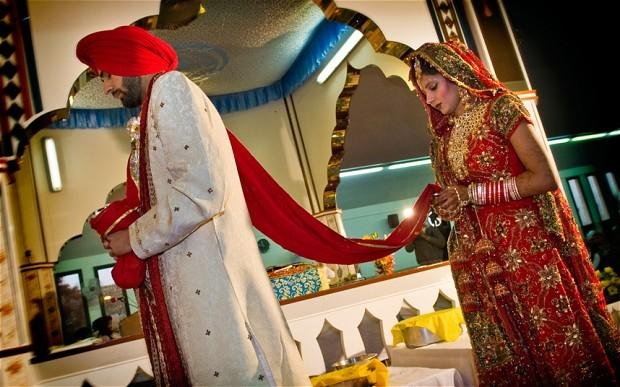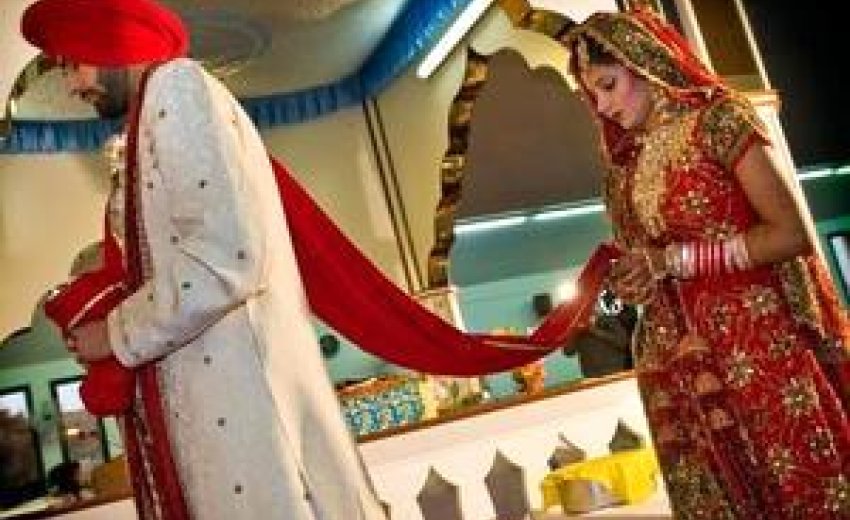
This is the first example of a religious group altering its marriage practices to avoid potential litigation (Photo: Alamy)
At least one religious group in the UK is throwing a mini-tantrum over the country’s Same-Sex Marriage Act, which (hooray!) received Royal Assent this week. Fearing that future legal challenges will force them to perform same-sex marriages, Sikh temples in England have been advised by a special advisory board called — and you’ll never see this coming — Sikhs In England to halt all civil marriage ceremonies, effectively rendering Sikh marriages non-binding in the eyes of the law.
According to the Telegraph, the Sikh huffiness about same-sex marriage isn’t a binding decree like something handed down from his Popeness — the advisory council is merely offering advice to Sikh places of worship (gurdwaras) in England. The advice, though, is being taken pretty seriously, and Sikh couples hoping to have their one-stop marriage needs satisfied by gurdwaras might instead find themselves compelled to register for two ceremonies — a purely symbolic religious ceremony and a civil ceremony that would actually have legal merit.
Though other religious groups like the Catholic Church and Church of England initially resisted the fairly recent same-sex marriage legislation, none of them have been so pouty as to surrender their marriage licenses. That’s because the marriage act has a so-called “quadruple-lock” of legal protections to ensure that individual religious groups aren’t forced to perform same-sex marriages. Best of both worlds, right? Same-sex couples can marry and arcane religious institutions can cleave to a vision of humanity that became obsolete sometime shortly after the Industrial Revolution.
 Not so for
at least some of the UK’s Sikhs. In a statement to the House of Lords,
Lord Harmander Singh, the director of the Network of Sikh Organisations, explained
that he wasn’t so sure this “quadruple-lock” would prove all that
effective. For starters, it clearly sounds like it was crafted by the
Little Rascals in their clubhouse. Not only that, but, according to
Lord Singh, no one can really foresee what will happen if the European
Court of Human Rights ever gets involved with an individual same-sex
marriage case. Hypotheticals abound:
Not so for
at least some of the UK’s Sikhs. In a statement to the House of Lords,
Lord Harmander Singh, the director of the Network of Sikh Organisations, explained
that he wasn’t so sure this “quadruple-lock” would prove all that
effective. For starters, it clearly sounds like it was crafted by the
Little Rascals in their clubhouse. Not only that, but, according to
Lord Singh, no one can really foresee what will happen if the European
Court of Human Rights ever gets involved with an individual same-sex
marriage case. Hypotheticals abound:
We are concerned that the quadruple lock isn’t going to be worth the paper it is written on.
In the longer term, as soon as there is an issue and it goes to the European Court of Human Rights, no one can be sure, because the quadruple lock means nothing under subsidiarity.
Just like churches or synagogues, gurdwaras are currently licensed to conduct weddings, which in the UK means that they can combine the civil paperwork with the religious ceremony. If a gurdwara follows the advisory council’s new advice, it would basically render its marriage ceremony entirely symbolic, and deeply inconvenience the newlyweds.

